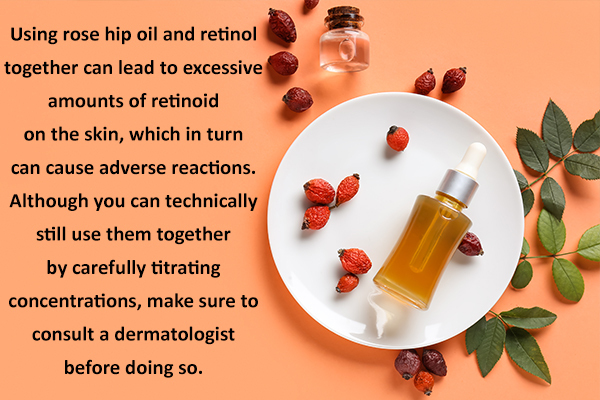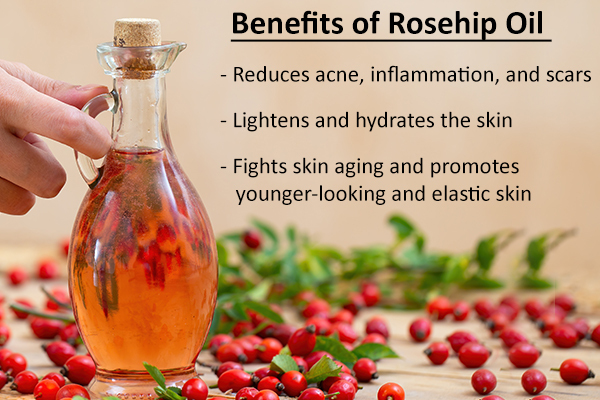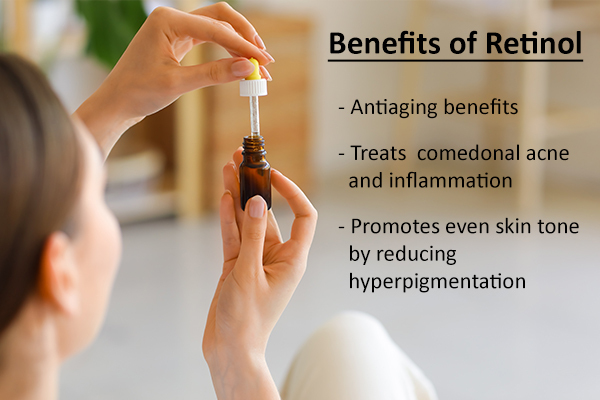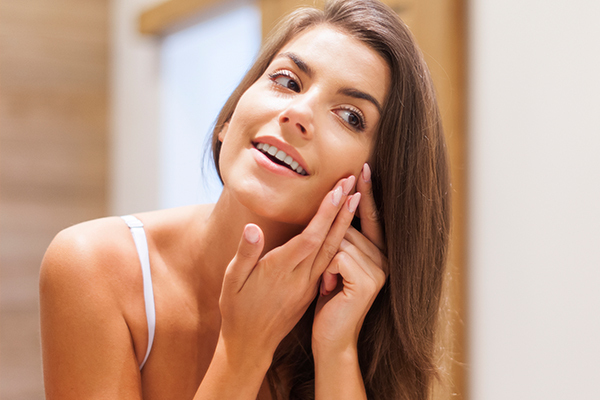In this article:
A healthy skin care routine is essential for maintaining the appearance and well-being of your skin. While many people use a number of skin care products such as face masks, moisturizers, and cleansers regularly, most of them are not aware of the properties of the different ingredients and the correct combinations of these products. (1)

Rosehip oil and retinol are two major skin care compounds that are found in a variety of skin care formulations. However, there is some debate on whether they can be used together.
Every skin type is different, and what works for some may not work for everyone. This article will take a deeper look at this issue.
Can You Use Rosehip Oil With Retinol?

There is some ambiguity among skin care experts and dermatologists on the simultaneous use of retinol and rosehip oil. While both compounds are beneficial for the skin, using them together may have a detrimental effect on delicate facial skin.
Retinol is a type of retinoid (vitamin A), and it is commonly used in concentrations ranging from low strength (0.1% to 0.3%) to high strength (1% or more). It is important to use retinol in appropriate concentrations according to the tolerance and skin type of each person. Overuse of retinol or high-strength concentrations can have adverse effects on your skin (irritation, mild burns, inflammation, etc.). (2)(3)
Rosehip oil, on the other hand, is known to contain trace amounts of tretinoin, (4) which is another retinoid. Rosehip oil typically contains around 0.03% of tretinoin. Tretinoin is a potent retinoid and can make your skin highly sensitive to sunlight in concentrations of 0.05% or higher. (5)
Hence, using rosehip oil and retinol together can lead to excessive amounts of retinoid on the skin, which in turn can cause adverse reactions. Although you can technically still use them together by carefully titrating concentrations, make sure to consult a dermatologist before doing so.
Rosehip Oil and Its Benefits

Rosehip oil is a natural medicinal oil extracted from the fruits of the wild rose species. It is filled with antioxidants and anti-inflammatory compounds that can be beneficial for the skin.
Rosehip oil can help treat acne, hyperpigmentation, and other skin conditions. It may also help improve the recovery rate of patients suffering from various diseases such as cancer, diabetes, kidney, and liver issues. (6)
1. Reduces acne, inflammation, and scars
Rosehip oil contains vitamin E and anti-inflammatory compounds such as polyphenols that can help treat inflammation and acne and lighten scars. (7) According to one research study published recently, rosehip oil helped in effectively fading surgical scars in patients. (7)
2. Lightens and hydrates the skin
Multiple studies have been conducted on the benefits of rosehip oil in treating hyperpigmentation and dark spots.
One particular research study published in 2019 showed a significant decrease in melanin production in mice due to the effects of quercetin – a compound extracted from rose plants and found predominantly in rosehip oil. (8)
Another scientific research carried out on brown guinea pigs showed a potential decline in melanin levels after ingestion of rosehip extracts. (9) Thus, the skin-lightening effects of rosehip oil are very much supported by both scientific and anecdotal evidence.
3. Fights skin aging and promotes young-looking and elastic skin
Rosehip oil is known to reduce wrinkles and fine lines on the skin, giving it a smooth and young appearance. Rosehip powder has been shown to be effective in increasing skin elasticity, hydrating the skin, and smoothening wrinkles. (3)
Side Effects of Rosehip Oil
Rosehip oil is a natural compound and side effects are rare. However, some people may experience:
- Skin irritation
- Allergic reactions, such as rashes and inflammation
- Comedonal acne, which involves blackheads and whiteheads and frequently occurs on the forehead and chin
- Nausea or vomiting, diarrhea, or heartburn if rosehip oil is taken orally
Retinol and Its Benefits

Retinol is a form of vitamin A (10) that is widely used in the treatment of acne and wrinkles. It helps increase the production of collagen in the skin. (11)(12)
Retinol is well tolerated by most skin types and is found in many skin care formulations. Its various benefits include the following;
1. Antiaging
Vitamin A plays a major role in delaying skin aging. It helps increase collagen production and increases cell turnover – both properties help reduce fine lines and wrinkles. It also decreases the sagging of the skin and gives it a firmer look.
Retinol also helps protect the skin against sun damage by reducing fine lines and wrinkles caused by exposure to UV rays. (2)
2. Treats comedonal acne and inflammation
Comedonal acne is a type of acne that causes several tiny acne bumps. It usually occurs on the forehead and sometimes on the chin. Comedonal acne is more often than not a result of debris-clogged pores and excess sebum.
Retinol can treat comedonal acne by helping increase cell turnover. It also helps express the contents of mature open comedones and suppress closed comedones, which means unclogging pores and control sebum deposits on the skin’s surface. (13)(2)
3. Promotes even skin tone by reducing hyperpigmentation
Retinol works on the melanocytes in the skin to reduce melanin synthesis and reduces hyperpigmentation and dark spots.
According to various studies, regular use of retinol can give you a smooth and even skin tone. (14) In fact, new research suggests that retinol may also help treat melasma. (15)
Side Effects of Retinol
There are a few side effects associated with the use of retinol in some people. These include:
- Allergic reactions (rashes, inflammation, etc.)
- Itching and irritation
- Dryness
- Redness
- Dermatitis
- Flaking
- Skin sensitivity
Most-Asked Questions
How to use rosehip oil on the skin?

Rosehip oil is a very gentle and light oil that can be used as a carrier oil for other ingredients. You can also add it to your moisturizer or directly apply the oil to your face using your fingers. Do not use more than 3 drops at a time.
Is rosehip oil effective on sensitive skin?
Yes. Rosehip oil is beneficial for all skin types. Make sure to perform a patch test beforehand to ensure you are not allergic to it.
Can rosehip oil be used every day?
Yes. Rosehip is a lightweight oil that can be applied to your face every day.
Does applying rosehip oil before retinol make retinol ineffective?
No, it does not.
Final Word
Rosehip oil and retinol are common ingredients used for skin care. Both compounds have anti-inflammatory, antioxidant, and acne-reducing properties. However, it is best to consult a dermatologist before using Rosehip Oil With Retinol together.
- Was this article helpful?
- YES, THANKS!NOT REALLY


